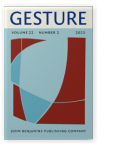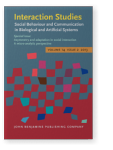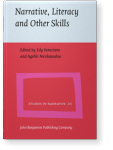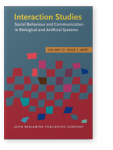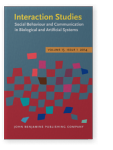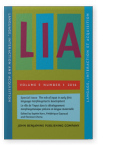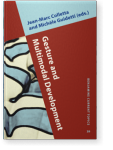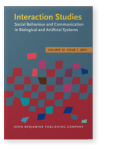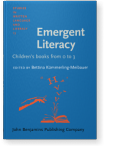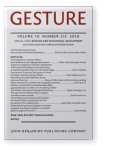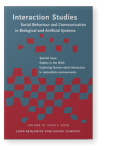Katharina Rohlfing
List of John Benjamins publications for which Katharina Rohlfing plays a role.
Journal
Title
Asymmetry and adaptation in social interaction: A micro-analytic perspective
Edited by Iris Nomikou, Karola Pitsch and Katharina Rohlfing
Special issue of Interaction Studies 14:2 (2013) xii, 178 pp.
Subjects Artificial Intelligence | Cognition and language | Evolution of language | Interaction Studies
Articles
2019 Chapter 4. Does emotional narrative context influence retention of newly learned words? Narrative, Literacy and Other Skills: Studies in intervention, Veneziano, Edy and Ageliki Nicolopoulou (eds.), pp. 91–107 | Chapter
In this pilot study, we hypothesized that emotional information in stories allows children to become involved in the verbal interaction. This involvement, in turn, might result in improving children’s ability to learn new words. To test this hypothesis, 20 German-speaking 2-year-old children… read more
2016 Language-at all times: Action and interaction as contexts for enriching representations Interaction Studies 17:1, pp. 128–153 | Article
This article discusses the importance of social interaction for the development of the representations for symbolic communication. We suggest that there is no need to distinguish between different representational systems emerging at different stages of development. Instead, we propose that… read more
2014 Tutoring in adult-child interaction: On the loop of the tutor’s action modification and the recipient’s gaze Interaction Studies 15:1, pp. 55–98 | Article
Research of tutoring in parent-infant interaction has shown that tutors – when presenting some action – modify both their verbal and manual performance for the learner (‘motherese’, ‘motionese’). Investigating the sources and effects of the tutors’ action modifications, we suggest an interactional… read more
2014 Intermodal synchrony as a form of maternal responsiveness: Association with language development The role of input on early first language morphosyntactic development: Le rôle de l’input sur le développement morphosyntaxique précoce en langue maternelle, Kern, Sophie, Frédérique Gayraud and Florence Chenu (eds.), pp. 117–136 | Article
Research findings indicate that synchrony between events in two different modalities is a key concept in early social learning. Our longitudinal pilot study with 14 mother–child dyads is the first to support the idea that synchrony between action and language as a form of responsive behaviour in… read more
2013 Asymmetry and adaptation in social interaction: A micro-analytic perspective Asymmetry and adaptation in social interaction: A micro-analytic perspective, Nomikou, Iris, Karola Pitsch and Katharina Rohlfing (eds.), pp. vii–xii | Article
2013 Educating attention: Recruiting, maintaining, and framing eye contact in early natural mother–infant interactions Asymmetry and adaptation in social interaction: A micro-analytic perspective, Nomikou, Iris, Karola Pitsch and Katharina Rohlfing (eds.), pp. 240–267 | Article
In a longitudinal naturalistic study, we observed German mothers interacting with their infants when they were 3 and 6 months old. Pursuing the idea that infants’ attention is socialized in everyday interactions, we explored whether eye contact is reinforced selectively by behavioral modification… read more
2012 Children’s lexical skills and task demands affect gestural behavior in mothers of late-talking children and children with typical language development Gesture and Multimodal Development, Colletta, Jean-Marc and Michèle Guidetti (eds.), pp. 129–155 | Article
To evaluate the influence of lexical development and task demands on maternal gestural behavior, we observed 17 German-speaking mothers and their children with typically language development (TD) and 9 mothers with their late talkers (LT) aged 22–25 months in task-oriented dialogues. Mothers… read more
2011 Mindful tutors: Linguistic choice and action demonstration in speech to infants and a simulated robot Interaction Studies 12:1, pp. 134–161 | Article
It has been proposed that the design of robots might benefit from interactions that are similar to caregiver–child interactions, which is tailored to children’s respective capacities to a high degree. However, so far little is known about how people adapt their tutoring behaviour to robots and… read more
2011 11. Mothers’ talking about early object and action concepts during picturebook reading Emergent Literacy: Children's books from 0 to 3, Kümmerling-Meibauer, Bettina (ed.), pp. 193–208 | Article
Early picturebooks mostly contain pictures of static objects that are useful in introducing rules of book behavior (Kümmerling-Meibauer & Meibauer, 2005). Yet, they do not evolve narratives with a temporal or sequential structure. Our study was motivated by the approach suggested in Mandler (2000)… read more
2011 Meaning in the objects Experimental Pragmatics/Semantics, Meibauer, Jörg and Markus Steinbach (eds.), pp. 151–176 | Article
In this paper, I am arguing that objects being present in the external situation ground the linguistic meaning. Furthermore, I will show that the nature of objects can change not only linguistic but also gestural behavior. Instead of simply excluding materialistic factors, I therefore suggest a… read more
2010 Children’s lexical skills and task demands affect gestural behavior in mothers of late-talking children and children with typical language development Gesture and Multimodal Development, Colletta, Jean-Marc and Michèle Guidetti (eds.), pp. 251–278 | Article
To evaluate the influence of lexical development and task demands on maternal gestural behavior, we observed 17 German-speaking mothers and their children with typically language development (TD) and 9 mothers with their late talkers (LT) aged 22–25 months in task-oriented dialogues. Mothers… read more
2009 Improving HRI design by applying Systemic Interaction Analysis (SInA) Robots in the Wild: Exploring human-robot interaction in naturalistic environments, Dautenhahn, Kerstin (ed.), pp. 298–323 | Article
Social robots are designed to interact with humans. That is why they need interaction models that take social behaviors into account. These usually influence many of a robot’s abilities simultaneously. Hence, when designing robots that users will want to interact with, all components need to be… read more
